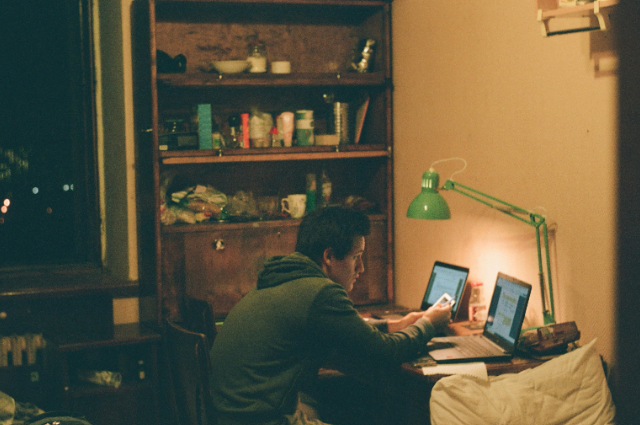
Photo by Max Shilov on Unsplash
And as the nascent smile of the sun steadily grew a sense of agency, I sat upon the hem of my sprawling sofa, staring blankly into the diminishing canvas of a wall. Unsurprisingly, the diminishing work of art suitably reflected the current state of my affairs; As I stood on the corridor of the present, my bountiful thoughts strode delightfully in the eventful pastures of my past and returned hopefully to my crestfallen present. Yet, this time, an inimitably delightful thought pressed sharply to enrich my present state of thought. And so, as the vestiges of my senile beard flailing against the cool breeze washing over me, my lip rigidly fixed on the sagging tip of my teacup, I tell you my delightful thought with sanguine optimism.
My tale begins deep midway in the year 2007, on the bridge that connects the months of June and July, where a radical act of utmost importance had transpired. The protagonist of the radical event was my friend Samuel. A little peek into the prevailing political situation in the country, though; the year was witness to one of the worst stock market crashes in recent memory. To predict the number of fluctuations of the stock market is akin to predicting the number of children that a poor couple will produce; you can only guess the minimum number. Yet, the stock market vacillated uncontrollably that year, which coerced the government to mitigate inflation in exigency; An urgent measure they earnestly took was to assume arrant control over private organisations; By handling the nature of their actions, and their intake of employees, the government utilised their restrictive power to curtail independent action, thus managing to slow the fast-capsizing economic boat.
Let me take a quick detour to introduce Samuel, though. Samuel was an intern with a demonstrated expertise in designing logos, which was a department central to the functioning of our company, which specialised in handling intellectual properties of people or small organisations, and forming companies on their behalf to fight against larger organisations. While Samuel was a designer intern, a new entrant into the company, I was running the last mile of the autumn of my career. I was a strict disciplinarian in the company, defiantly with the company across the vicissitude of the good and bad seasons in the company. Yet, as the government took over the company that year, and provided control to a private organisation, well-functioning transparent systems were compromised. For a kick-off, the clients were devoid of any right to co-ordinate with the management for their designs, the management assumed overall autonomy of all the designs, breaking the chain of communication between the customer and the management. Further, the designers were detached from their streams of thought, and were constrained to condone with the design, even if it did not suit the operation.
The incipient frustration that manifested in the inchoate weeks of the change simmered into widespread discontentment into the months that followed. I was torn between the feelings of loyalty to the company while being opposed to the extractive processes of the company, and yet, as multiple fragments of my ethics tethered against my longstanding bond to the company, I grew increasingly dissociated from my feelings and resolved to work mindlessly.
In such a predicament, Samuel seized control of the initiative and vehemently opposed the proceedings in the company. He snapped angrily, saying, “No, I will not make the logo bigger, because it does not fit his modus operandi for the client”, much to the chagrin of the upper hierarchy, to the unmistakable delight of an exasperated client. What followed was a damning indictment of the power of the butterfly effect, which prompted an entire team of designers to effectively terminate the extractive processes in the company. Soon, the intellectual property and patent team, followed suit, protesting unabashedly against the management, coercing the upper echelons of hierarchy to introduce accountability and allow clients to exercise a reasonable amount of control over their status.
The act was radical and transformative in the way it coaxed a management to totally reconsider the way it functioned, demotivating the government from exerting despotic control and allowing companies to take independent influence to curb the tide of the economy. An intern made the news for radically causing organisations to modify their entire manner of management. The radical act made the news for its widespread exploits; Yet, in my opinion, the genuinely radical act was the way Samuel reformed my mindset, and my thoughts; To fight for what is correct even when you have no apparent right to, even when external influences attempt to deter you, was a radical act in itself. So, there you go, radicalism can be just as subtle, just as delicate and just as moderate when it inspires at least a single other person. And what was the influence of his radical attempt; It made me pick up a pen, and write down this short story, for the first time in my life, and hopefully not for the last time.
